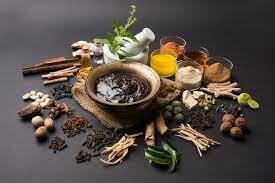
In the bustling world of modern nutrition, where trends come and go, Ayurveda stands as a timeless beacon, offering holistic wisdom that transcends fads. Ayurveda, the ancient Indian system of medicine, places a profound emphasis on balanced living, and the key to this equilibrium lies in a well-rounded and nourishing diet. In this blog, we will delve into the fascinating realm of Ayurvedic nutrition, exploring the concepts of a balanced diet, eating according to your dosha, the power of Ayurvedic superfoods, treating food as medicine, and the art of mindful eating.
Balanced Diet in Ayurveda
The core tenet of Ayurvedic nutrition is the concept of a balanced diet, which aims to harmonize the three doshas – Vata, Pitta, and Kapha. According to Ayurveda, each individual has a unique constitution, or Prakriti, determined by the dominance of these doshas. A balanced diet in Ayurveda is one that caters to the specific needs of an individual's dosha composition, maintaining equilibrium within the body.
For Vata individuals, who tend to be creative and energetic but prone to anxiety and digestive issues, a balanced diet includes warm, nourishing foods that pacify the cold and dry qualities of Vata.
Pitta individuals, characterized by their fiery and ambitious nature, benefit from a diet that cools and soothes, incorporating sweet, bitter, and astringent tastes to counteract excess heat and acidity.
Kapha individuals, known for their calm and steady demeanour but susceptible to lethargy and congestion, thrive on a diet that is warm, light, and slightly spicy to counterbalance their inherent heaviness.
Eating for Your Dosha
Tailoring your diet to your dosha is a key principle in Ayurvedic nutrition. This involves understanding your individual constitution and making food choices that align with its specific needs. For example:
- Vata individuals should focus on warm, grounding foods such as cooked grains, root vegetables, and warming spices like ginger and cinnamon.
- Pitta individuals benefit from a diet rich in cooling foods like cucumbers, mint, and leafy greens, along with a moderation of spicy and acidic elements.
- Kapha individuals thrive on light, pungent, and bitter foods, including legumes, cruciferous vegetables, and spices like black pepper and turmeric.
Ayurvedic Superfoods
In the world of Ayurvedic nutrition, certain foods are celebrated for their exceptional healing and balancing properties. These are often referred to as Ayurvedic superfoods. Incorporating these nutrient-dense options into your diet can enhance your overall well-being and bring your doshas into harmony.
Turmeric: This golden spice is a potent anti-inflammatory and antioxidant, making it a staple in Ayurvedic diets. It supports digestion, reduces inflammation, and promotes overall vitality.
Ashwagandha: Known as an adaptogen, ashwagandha helps the body adapt to stress and supports a balanced nervous system. It is particularly beneficial for Vata types.
Ghee: Clarified butter, or ghee, is considered a sacred and nourishing food in Ayurveda. It is believed to enhance digestion, lubricate tissues, and support mental clarity.
Food as Medicine
In Ayurveda, the idea of "food as medicine" is deeply ingrained. The emphasis is on using food not just for sustenance but also as a powerful tool to maintain health and prevent imbalances. Ayurvedic nutrition views each meal as an opportunity to nourish the body, mind, and spirit.
For example, incorporating warming spices like cumin and coriander in your meals can aid digestion and balance Vata. Similarly, including cooling herbs like mint and fennel can pacify Pitta-related heat and acidity. Kapha individuals may benefit from incorporating stimulating spices like ginger and mustard seeds to counteract lethargy and promote circulation.
Mindful Eating
Ayurveda places great importance on the art of mindful eating – the practice of being fully present and conscious while consuming your meals. This involves savoring each bite, appreciating the flavors, and paying attention to the body's hunger and fullness cues.
In the rush of modern life, we often overlook the profound connection between our food and well-being. Mindful eating not only enhances digestion but also allows us to cultivate a deeper awareness of the impact of different foods on our body and mind. It encourages gratitude for the nourishment we receive and fosters a more harmonious relationship with the act of eating.
In a world where dietary trends come and go, Ayurvedic nutrition stands as a timeless guide to balanced and holistic living. By understanding and embracing the principles of a balanced diet, eating according to your dosha, incorporating Ayurvedic superfoods, treating food as medicine, and practicing mindful eating, you can embark on a journey towards optimal well-being that aligns with the wisdom of the ancient Ayurvedic tradition. As you explore this profound approach to nutrition, may you find balance, vitality, and lasting health on your path to a more harmonious life with AyurvedaLiving. Click here to book your consultation with our Ayurveda Practitioner now!
Note: The information in this article is intended for your educational use only and is not a substitute for professional medical advice, diagnosis, or treatment. Always seek the advice of your physician or other qualified health providers with any questions you may have regarding a medical condition and before undertaking any diet, supplement, fitness, or other health programs.





